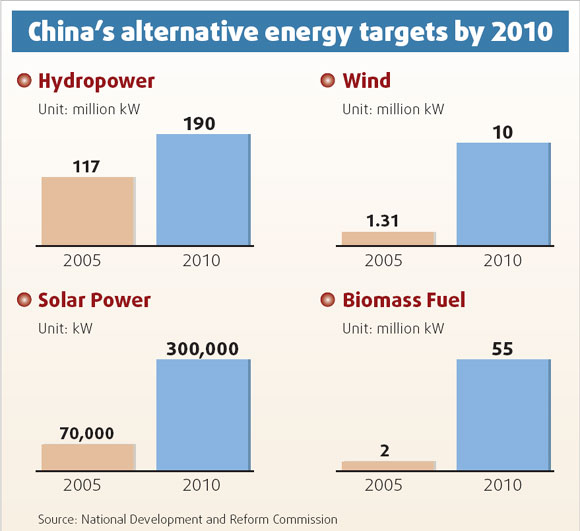 |
|
Clean energy poised to take bigger share
By Fu Jing (China Daily) Updated: 2008-03-19 07:29 Renewable energy is expected to make up 10 percent of the country's energy mix by 2010, up 2.5 percentage points from the current level, the National Development and Reform Commission (NDRC) said yesterday.
The NDRC announcement, part of the national renewable energy program for 2006 to 2010, came with concerns that the country's total energy consumption will in two years surpass the equivalent of a targeted 3 billion tons of coal at the current pace of economic development. "China is rich in renewable resources but we need sophisticated technologies," the commission said in the program report. The commission said the country will continue to tap its rich store of hydropower, which will reach 190 million kW by 2010, up from 117 million kW in 2005. Similarly, wind farms will generate 10 million kW by 2010, up from 1.31 million kW in 2005. Solar power and bio-fuels will also play a bigger role in energy resources. The sun's rays are expected to generate 300,000 kW by 2010, up from 70,000 kW in 2005, while bio-fuels will produce electricity of 55 million kW in two years, up from 2 million kW in 2005. The NDRC report, which can be downloaded at its website at www.ndrc.gov.cn, said its plan was readjusted with the country's mid- and long-term renewable energy program in mind. In the long term, the authorities plan to make clean energy sources account for 16 percent of total energy consumption, by 2020.
Large-scale research is needed to maximize the potential of renewable energy to meet the country's demand, a commission source who did not want to be named told China Daily. He said the authorities are committed to identifying and developing new energy sources and finding practical applications for them. The government is also pushing to promote international exchange and work with foreign counterparts to train high-level professionals in the sector. Policies on energy will give priority to five areas - solar power, biomass fuels, wind power, hydrogen energy and natural gas utilization - and the government will provide additional funding for research projects and offer preferential tax rates for those involved in the development and use of renewable energy, the source said. The latest push for clean energy comes amid a record high in global oil prices, which has surpassed $110 a barrel. "From a business perspective, it's already cheaper if we turn to alternative energy," the source from NDRC said. The International Energy Agency has said that it is cheaper to switch to alternative energy when the oil price goes above $70 a barrel. Ma Kai, former minister of the NDRC, had said earlier that the country has been implementing energy-saving measures to realize its targeted energy consumption ceiling of 3 billion tons of coal equivalent by 2010. Last year, the country consumed 2.65 billion tons of standard coal equivalent, up 7.8 percent from the year before, even as consumption growth slowed by 1.81 percent year-on-year. Energy consumption per unit of GDP was 1.1663 tons of standard coal equivalent, down 3.27 percent from 2006. That decline was 1.94 percent faster than the year before. Last year, the country saved a notable 89.77 million tons of standard coal equivalent in energy. According to the country's 11th Five-Year Plan, energy consumption per unit of GDP is targeted to go down by 20 percent between 2005 and 2010, by improving resources, utilizing efficient technology, and saving energy. "We are still faced with many challenges in meeting the ceiling target," Ma said. "Our development pace is too fast."  (China Daily 03/19/2008 page8) |
|